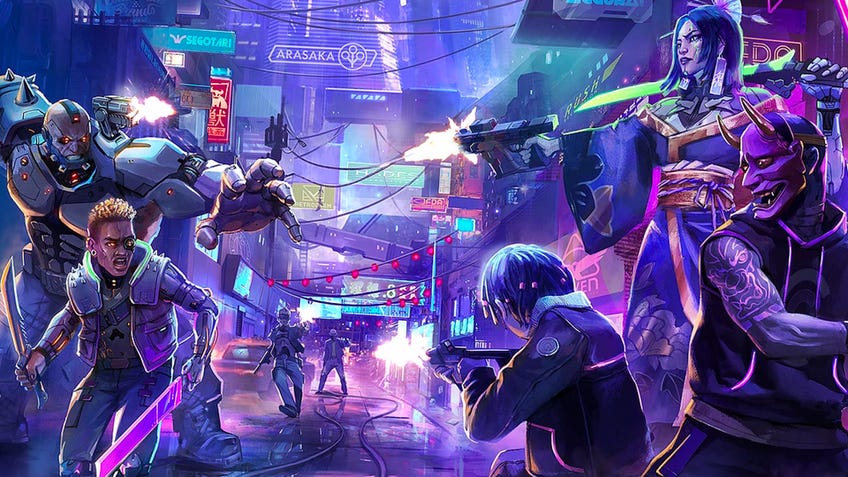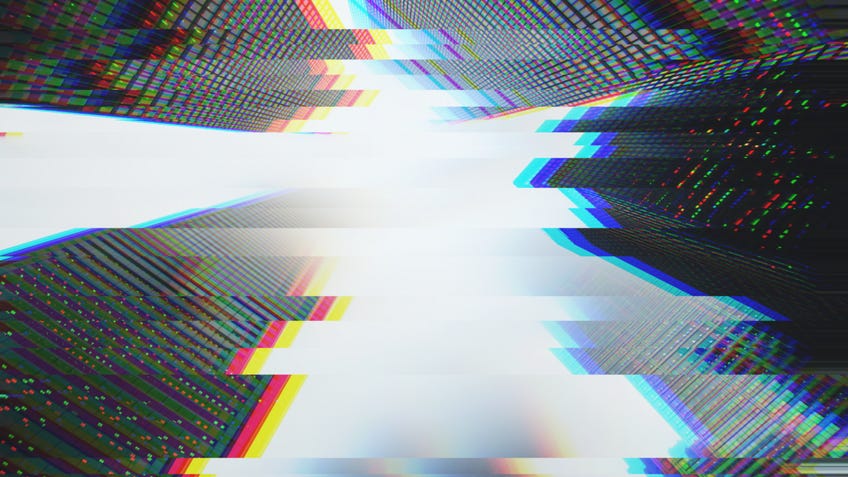New RPG book ARCON is ready to leave tired ideas about cyberpunk settings in the past
Building a better dystopian sandbox.
Tabletop designers Kienna Shaw and Jason Cutrone believe RPG players deserve better than another rain-soaked and vaguely Asian world to explore. Their new sourcebook, ARCON: City of Neon Daylight, is an attempt to modernise the creative bounds of cyberpunk by providing groups with a system-agnostic collection of narrative building blocks free from the genre’s more harmful and lazy tendencies.
Shaw and Cutrone sat down with Dicebreaker to talk about the inspiration and drive behind ARCON, revealing that it spawned from a play-by-post roleplaying session that gradually accreted so much lore and specificity that they one day discovered they had enough to fill an entire book.
“I would love to see some cyberpunk that isn't so nihilistic, or based on sexism and racism and other forms of bigotry,” Shaw said. “Jason and I started talking, and we realised we could actually take what we're building in our play-by-post and build it into something more that other people could use.”
The work of translating the scribbled notes and personal details into what would become ARCON began in late 2020, around the time CD Projekt Red’s long-anticipated video game Cyberpunk 2077 was nearing release. Reviews and reactions panning its by-the-numbers flavour and uninteresting gameplay proved to Shaw and Cutrone there was a hunger for someone to come along and shake up the cyberpunk formulae.
“I would describe ARCON as if cyberpunk is a new type of punk setting that is based on now rather than the ‘80s,” Shaw said. Both designers share a love for old cyberpunk literature and films but feel too much recent art obsesses over checking aesthetic boxes and ignores its core of class struggle. “When we're looking at everyday people, it's blood and energy and workings rather than getting caught up in ‘look at how cool their cybernetic arm is.’”
The setting described in ARCON’s 100-plus-page book encompasses a massive metropolitan city full of factions - both corporate and otherwise - decades-long conflicts, entertainment, urban legends and too many people just trying to get by. It sounds like a love letter to Blade Runner or Neuromancer until Shaw and Cutrone both shake their heads at the thought of one more campaign that rehashes all the old economic and cultural anxieties of their parents’ generation.
We don't need to tap into the typical Chinatown neon sign aesthetic that seems to plague so much cyberpop.
“While there's respect to the pillars of the genre, it's also taking those elements and saying, ‘Okay, we already live in a world where, for instance, corporations do have too much power and paramilitary outfits possess a level of influence that isn't accessible to a common person,’” Cutrone said. “So how do we take this sort of terrifying idea that sprang out of the ‘80s and apply it to a world where sometimes that has already happened?”
Shaw described the concept of “cyberpop” as a well-meaning but ultimately naive attempt to create art that tackles the same issues cyberpunk has historically - and not always successfully - deployed. Cyberpunk 2077 is a good example, with its uncritical depiction of race and gender stereotypes, and questions regarding cybernetics and transhumanism. It’s as if the goalposts for art that challenges the player haven’t moved in nearly 40 years.
“[In ARCON] we're not talking about dark and gritty; we're talking about this bright, in-your-face world. Kind of the same way that nothing in terms of our corporate culture right now is hidden in the shadows - it's all just blatantly in the daylight, and it's normalised,” Shaw said.

Other notable differences include reimagining what collective pushback to those blatant corporations looks like, directly influenced by the political activity of Shaw and those close to them. “I have a lot of friends who are in mutual aid groups or who interact with community support groups,” they said. “I'm kind of realising how much of that was important to me in cyberpunk - to realise and to have in there that resistance and community [action] doesn't always look like violence.”
The embodiment of this is the Upstarts, a faction of workers composed largely of corporate employees dismantling or changing the system from within. That they draw a paycheck from a villainous entity doesn’t make them villainous by association. It’s a direct eye-roll to the sort of people who attempt to criticise progressive or anti-capitalist adherents for owning a smartphone or using a bank. Just like us, ARCON’s population lives in a society.
How do we take this sort of terrifying idea that sprang out of the ‘80s and apply it to a world where sometimes that has already happened?
Cutrone wanted ARCON to showcase a cultural mosaic in its worldbuilding, a “sense of heterogeneous elements and groups of society coming together, not losing their individual identities in the process of becoming ARCONites”. Globalism happened, but not for the paycheck-to-paycheck crowd. Corporations melded their identities through mergers and buyouts, while the blue-collar crowd fought daily to preserve their livelihoods, which includes all manner of cultures, traditions and social preferences.
The designers claimed excising the concept of “Asian Dominance” from the fabric of their cyberpunk world solved a lot of their problems. “There's no official description of cities. We don't need to tap into the typical Chinatown neon sign aesthetic that seems to plague so much cyberpop.”
The setting book isn’t designed to tell a specific story. Instead, the designers enshrined specific truths about their world that they hope will empower players to tell all kinds of fresh narratives. Some of these truths include: corporations are always bad, but good people will work there just to make a living; cybernetics, prosthetics and artificial bodies are not maligned or tied to personhood in an ableist way; and a huge concern is who currently controls data - personal and otherwise - and who should that information belong to.
Many of these concerns are personified through NPCs and factions such as Blank Slate, a company that rose quickly to power in the very literal fallout of the Merriweather nuclear meltdown. It patented and sold acid rain-proof gear and now lobbies against any ecological regulations that would potentially erode their market.
The book will provide history, geography and an overview of the city’s major players, along with interesting locations, NPCs and plot hooks while keeping the specifics vague. Those holes are meant for groups to come along and fill on their own, transforming ARCON - or whatever they decide to name the city - into an exciting and unique campaign world.
“I think a sandbox is important because you're saying ‘here are the defined boundaries’, and then here's the materials that are in it. Figure out play, how you want it to be,” Shaw said. “We're providing them this specific sandcastle mould, and here's this shovel, and here's this particular pail. You can not use them if you want to. But it's really easy to use them if you do.”
ARCON is currently being sold on Shaw’s Itch.io page as part of an ongoing Itchfunding campaign. Backers can secure a digital copy of the setting book - as a PDF and screen reader-friendly text version - for $20 (£15), with any planned stretch goals available to all who purchase.


